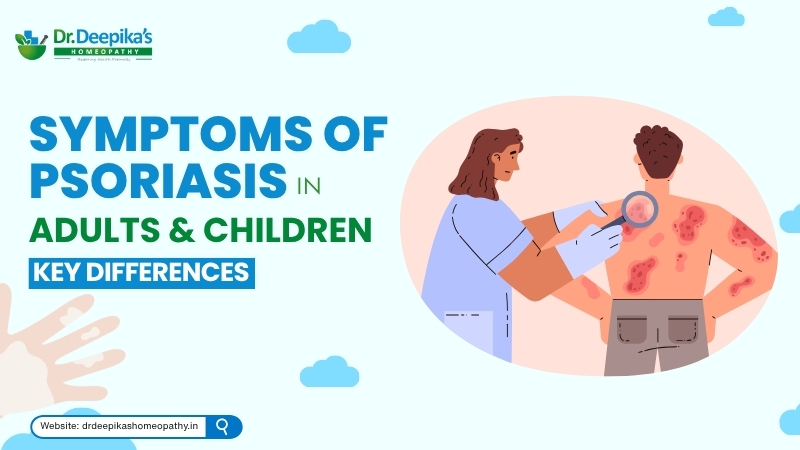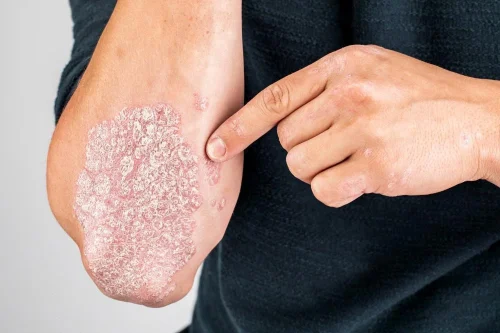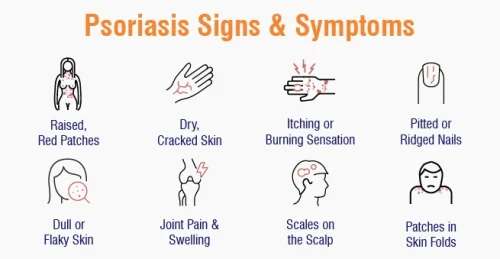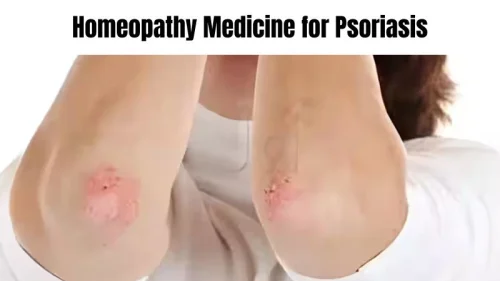
Symptoms of Psoriasis in Adults and Children: Key Differences
Psoriasis is a chronic skin condition that affects both adults and children, causing red, scaly, itchy, and inflamed patches. While symptoms may appear similar, adults often have thicker, stubborn plaques, whereas children usually develop milder patches, often triggered by infections. Understanding these differences is key for early diagnosis, effective management, and long-term skin health.
What is Psoriasis?
Psoriasis is a type of autoimmune skin disease that speeds up the body’s immune response to the process of skin cell turnover. Skin cells normally turn over and replace themselves on about a once-a-month basis, but in cases of psoriasis, this can be reduced to a few days. This excess skin cell turnover causes a buildup of dead skin cells on the surface, resulting in thick, scaly patches and possible itch or discomfort.

Symptoms of Psoriasis in Adults
Adults typically present with more well-defined and chronic symptoms of psoriasis than children. The severity of the overall condition can range from mild to severe and is often associated with other health issues such as diabetes, arthritis, and depression.
1. Thicker and Larger Plaques
Adults usually have thicker plaques that have more definition and heavier scaling. The skin that is affected can look dry, rough, and raised. Often, these plaques combine to form so-called layers, which have the potential to crack and bleed.
2. Chronic and Recurrent
Psoriasis typically recurs in the adult patient many times over the course of the individual’s life. Even with successful treatment, the psoriasis lesions can worsen or return, most commonly due to infections, stress, and/or medications.
3. Scalp Psoriasis
Scalp psoriatic patches are a very common presentation in adults, providing thick scales and itching that extends beyond the hairline. It can cause temporary hair loss due to inflammation and/or scratching.
4. Nail Psoriasis
Nail pitting, discolouration of the nails, and/or thickened nails in the adult patient are common. In severe cases, the nails can separate from the nail bed.
Joint Pain and Stiffness
Some adults will eventually develop psoriatic arthritis, which is associated with joint swelling and pain. Psoriatic arthritic lesions may develop years later after the initial presentation of skin symptoms.
Emotional and Psychological Problems
Adults with psoriasis are treated regularly for low self-esteem, anxiety, and/or depression associated with visible patches and long periods of discomfort.

Symptoms of Psoriasis in Children
Psoriasis may manifest differently in children compared to adults, and it is often mistaken for eczema or a fungal infection in children. The severity of the condition is often milder than that of adults.
Smaller and Softer Lesions
Children’s skin tends to be more sensitive, resulting in a psoriasis patch that is smaller, softer, and less scaly than psoriasis on an adult. The affected areas may also be smooth and red.
More Common in the Face and Diaper Area
Psoriasis, unlike in adults, can occur on the face or around the eyes, as well as in the diaper area. With infants, this can often be confused with diaper rash.
Guttate Psoriasis Post Infection
Often after a throat infection (commonly strep throat), the child may come down with guttate psoriasis, which appears as tiny red spots on the arms, legs, and/or trunk. It normally resolves after a few weeks, but, can turn into plaque psoriasis as they continue to age.
Scalp and Nail Modifications
Children, like adults, can have scalp-type psoriasis, but children tend to have a thinner patch with less flaking of skin. They may also have changes to their nails that could be seen as tiny pits or discoloration.
Mild Itching and Discomfort
Children may report itching or a burning sensation (particularly at night), that can, if scratched, may result in infection or worsening of the rash.
Emotional Effect
Even young kids may feel shame or anxiety about visible skin changes. Seeking out early counseling and parental support is critical for building their confidence and protecting their mental health.
Homeopathy Medicine for Psoriasis
Homeopathic medicine for psoriasis provides a natural and gentle way to treat the condition by addressing its root causes, such as immune imbalance, stress, and genetics. It helps reduce flare-ups, itching, and scaling, while promoting long-term skin health, balance, and overall well-being.
Commonly Used Homeopathic Medicines for Psoriasis
Arsenicum Album – Best for dry, rough, scaly skin that is itchiest at night. It can also assist those experiencing anxiety or restlessness during a flare-up.
Graphites – Recommended for thickened skin that is cracked and weeping. Particularly beneficial for psoriasis that is affecting the scalp, behind the ears, or joints.
Sulphur – Beneficial for red, inflamed patches of skin that itch and burn, especially when heated.
Kali Arsenicosum – A great treatment for chronic psoriasis with silvery white scales and deep fissuring, particularly when the skin is extremely dry.
Mezereum – Effective when thick crusts develop on the affected skin or scalp, with itching and irritation.
Natrum Muriaticum – For psoriasis linked to emotional sadness and/or grief, and may be related with involve lesions involving the hairline or scalp.
Sepia – common for women who are experiencing hormonal changes that trigger or amplify psoriasis symptoms.

Disclaimer
The content of this blog is intended for educational and informational purposes only. It is not medical advice, diagnosis, or treatment. Psoriasis is a medical condition that differs from person to person, and treatment should always be individualized. Always seek the advice of a qualified homeopathy doctor or dermatologist before starting any new medicine.
Conclusion
In conclusion, psoriasis is a long-lasting skin condition that affects both adults and children differently, but with proper understanding and timely care, it can be effectively managed. Early recognition of psoriasis symptoms helps in selecting suitable treatment and preventing flare-ups. Adults usually experience thicker, recurring plaques with emotional stress, while children often have milder, infection-related patches. Along with medical guidance, Dr. Deepika’s Homeopathy offers a safe and holistic approach to reduce inflammation, relieve itching, and minimize recurrence naturally—helping individuals achieve healthier skin, inner balance, and renewed self-confidence.